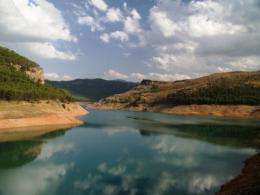This is the reservoir basin Tranco Segura (Jaén). Credit: Álvaro Martín and Alicia Urrea
There is some discrepancy among the scientific community as to the situation of reservoirs in Spain, one of the countries with the greatest water stress in Europe. For this purpose, a team of researchers has surveyed experts and has determined which basins in Spain have the most water problems.
Given the subjectivity and uncertainty surrounding the assessment of Spanish water basins, scientists from the Facultad de Ciencias Económicas y Empresariales (Business School) of the University of Rovira i Virgili (URV) and the Facultad de Ciencias Sociales y Jurídicas (Legal and Social Sciences Faculty) of Miguel Hernández University (UMH) surveyed 149 experts between December 2006 and February 2007 who are responsible for the management of hydraulic policy, specifically for sewage treatment companies.
"The data obtained for each basin were not mutually comparable, although they will enable measures to be considered to alleviate the situation", Antonio Terceño-Gómez, one of the authors of the study and a researcher at the URV Business School, explains to SINC.
The results of the study, which was recently published in the journal Ingeniería Hidráulica en México, show that the Sur, Baleares and Segura water basins are "the most worrying", followed by the Ebro, Júcar, Cataluña, Guadalquivir and Tajo basins.
According to the study, "the most water-deprived basins were those with the lowest runoff coefficients. The Sur basin, however, which is the most water-deprived, has a runoff coefficient of 25%, with a mean rainfall of 531 mm. This is due to the prospective increase in demand that exceeds, among others, the Júcar and Segura basins, with lower coefficients" indicates José Manuel Brotons Martínez, another author and researcher at the UMH.
Conversely, the basins with the least water stress were Canarias and Duero, followed by the Norte and Guadiana basins. The researchers further commented that "experts do not consider the past or future evolution of these reserves to be of concern, in spite of a runoff coefficient of 18%".
In the case of the Ebro, similar in level to that of the Júcar, it is due to the evolution of its reserves and "to the much debated issue of the water transfer project, which may have a bearing on the perception held about its evolution".
Alternatives to improve the situation
During their survey, the researchers requested the assessment of each basin, including aspects such as the reduction of reserves and increased demand in recent years, prospective evolution of surface and underground waters, and prospective growth in agricultural and urban demand.
From the responses, the researchers determined the best option for each basin in order to resolve water shortage problems. José Antonio Trigueros-Pina, another author and researcher at the UMH, states that "for basins in the mid-south of the peninsula (Guadiana, Guadalquivir y Júcar) water transfer is the second option".
Furthermore, water transfer from the Ebro, Canarias, Baleares, Duero and Norte basins is one of the worst options, as these basins "would need more desalination, as is the case for those in Catalonia", explain the experts.
But in the case of the Sur basin, water transfer is becoming essential: The scientists emphasise that "water transfer is one of the best options for the two most problematic basins in the peninsula (Sur and Segura)".
The Spanish Ministry of the Environment and Rural and Marine Affairs (MARM) approved the transfer of water from the Tajo to the Segura last 20 January. The surplus from the Tajo solves the problem of water supply for 2.5 million people from 79 towns in Murcia, Alicante and Albacete, and ensures the survival of woody plantations.
More information: Terceño-Gómez, Antonio; Brotons-Martinez, José Manuel; Trigueros-Pina, José Antonio. "Assessment of water needs in Spain" Ingeniería Hidraúlica en México 24(4): 7-22, Oct-Dec 2009.
Provided by FECYT - Spanish Foundation for Science and Technology




















